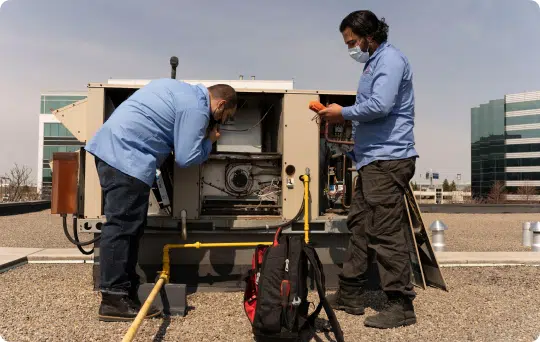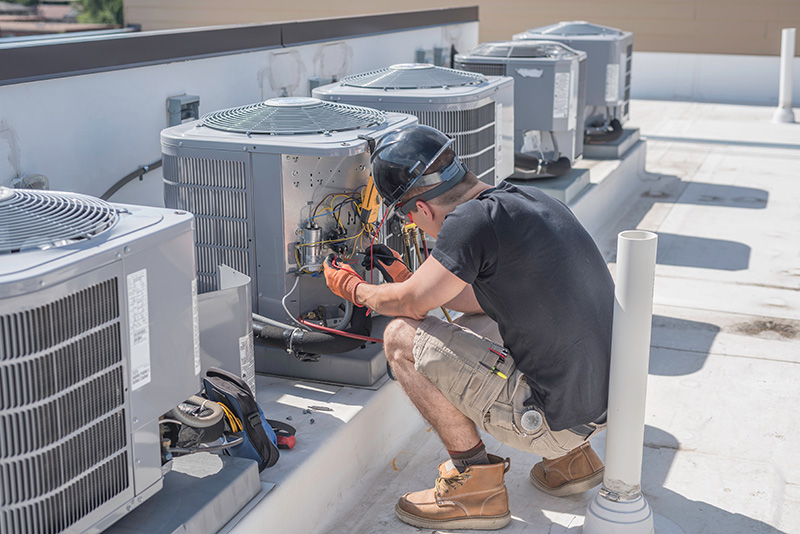Energy-Efficient Systems Installed by DMAKS HVAC Specialists.
Energy-Efficient Systems Installed by DMAKS HVAC Specialists.
Blog Article
Just How to Select the Right Cooling And Heating System for Your Requirements
Choosing the appropriate heating and cooling system is a vital choice that calls for mindful factor to consider of different factors. Begin by reviewing your home's dimension, format, and special requirements, as these elements determine the required ability and setup of the system. Furthermore, establishing a spending plan that incorporates installment and long-lasting operational expenses is vital. As you evaluate your alternatives, understanding energy effectiveness rankings and the effects of your regional climate will play a considerable duty in your option. The myriad of system types available can complicate this procedure, leading one to ask yourself which path eventually leads to optimum convenience and efficiency.
Assess Your Home Dimension
Examining your home dimension is a crucial first action in choosing the proper heating and cooling system. The size of your home directly affects the heating & cooling ability needed for reliable climate control. A heating and cooling system that is too little will battle to maintain comfy temperature levels, resulting in boosted energy usage and wear on the unit. Alternatively, a large system can cause short biking, inadequate humidity control, and inefficient procedure.
To properly assess your home dimension, determine the square video of each room, considering aspects such as ceiling elevation and the format. Furthermore, take into consideration the insulation high quality and the number of windows, as these components influence thermal performance. Homes with open floor plans may need different system configurations compared to those with numerous divided spaces.
Utilizing the Manual J tons computation approach can supply a more specific quote of your a/c needs. This approach represent various factors, consisting of local environment, solar gain, and occupancy patterns. By thoroughly evaluating these elements, you can guarantee that your picked a/c system is properly sized, leading to boosted comfort, power efficiency, and long life of the equipment.
Determine Your Spending Plan
Identifying your spending plan is a critical action in the a/c system selection process, as it establishes the parameters for your alternatives - DMAKS HVAC. A heating and cooling system is a significant investment, and recognizing your financial limitations will assist tighten down choices that fit within your ways
Begin by analyzing not only the preliminary acquisition price however additionally installation expenses, which can vary significantly depending upon the complexity of the task. Moreover, take into consideration continuous expenses such as maintenance, fixings, and energy usage. A system may appear economical at first yet can lead to higher costs in time if it is much less reliable.
It is suggested to allocate a contingency fund for unexpected costs that may develop throughout installment or first system changes (DMAKS HVAC). Additionally, explore financing options or rebates that may be available, as these can ease the burden of upfront costs
Ultimately, having a clear spending plan enables you to engage with cooling and heating experts much more effectively, guaranteeing you receive customized guidance that straightens with your monetary objectives and home requirements. By being diligent regarding your budget, you can make enlightened decisions that boost comfort without endangering monetary security.
Evaluate Energy Performance
Energy effectiveness plays an essential duty in the overall performance and cost-effectiveness of your A/c system. Look for systems with a high Seasonal Power Efficiency Ratio (SEER) for cooling and a high Annual Gas Use Performance (AFUE) rating for heating.
Additionally, think about the Energy Celebrity accreditation, which indicates that the system meets stringent efficiency guidelines set by the Environmental Protection Company. Investing in an Energy Star-rated cooling and heating system can result in considerable financial savings with time, specifically in areas with severe temperature variations.
An additional aspect to examine is the system's dimension and capability. A large or small system can result in ineffectiveness and enhanced energy costs. DMAKS HVAC. Proper sizing, frequently identified through Visit Website a Manual J lots estimation, makes sure that the system runs at ideal efficiency


Consider Climate and Atmosphere
When choosing a cooling and heating system, it is crucial to consider the regional climate and environmental conditions, as these aspects substantially affect the system's efficiency and effectiveness. Various regions experience varying temperature extremes, humidity levels, and seasonal changes, all of which impact heating and cooling demands.

Additionally, neighborhood environmental variables, such as air quality and prospective irritants, ought to notify your selection. Systems furnished with advanced filtering modern go now technologies can help reduce toxins and give cleaner air. Additionally, think about the power sources available in your area-- some cooling and heating systems are much more effective when powered by gas or renewable resource sources.
Eventually, straightening your cooling and heating system selection with your local climate and environmental factors to consider will certainly bring about enhanced comfort, improved effectiveness, and lower energy expenses.
Explore System Kind and Functions
As home owners look for to maximize convenience and efficiency, exploring the various kinds of cooling and heating systems and their distinct attributes comes to be vital. The primary kinds of a/c systems include central air, heatpump, ductless mini-split systems, and heaters. Each system supplies distinctive benefits customized to various requirements and preferences.
Central air systems offer uniform cooling throughout a home, making them ideal for larger rooms. Warmth pumps function as both heating and cooling services, utilizing electricity to move warmth, which can lead to lower energy prices. Ductless mini-split systems are coming to be progressively prominent due to their adaptability and convenience of setup, allowing home owners to regulate the temperature in private rooms without extensive ductwork.

Conclusion
To conclude, choosing the ideal cooling and heating system necessitates careful consideration of different aspects, consisting of home dimension, budget plan restraints, power performance, neighborhood climate, and available system types. A comprehensive evaluation of these aspects guarantees ideal comfort and cost-effectiveness. By following a structured approach, property owners can make informed decisions that straighten with their details demands and choices, eventually causing improved indoor air quality and power financial savings.
Report this page